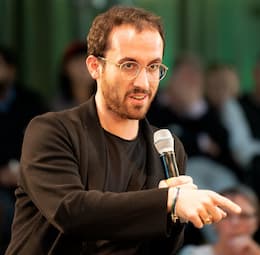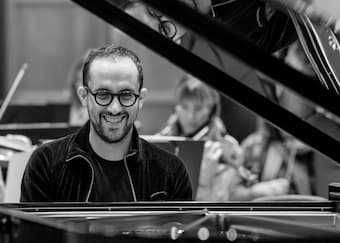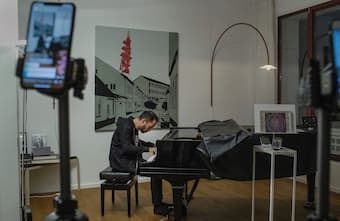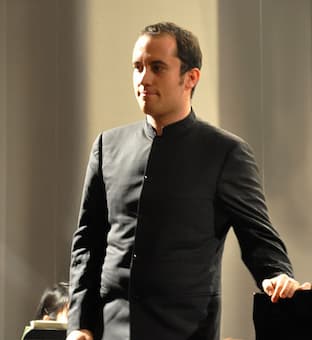
Igor Levit
While pianists Yuja Wang and Lang Lang have undoubtedly achieved mass-market appeal, Igor Levit has, at least in German-speaking countries, become a political figure and social advocate. He is not only considered one of the best pianists of the century, but also a familiar face on mainstream TV. He participates in political panel discussion, articulates his leftist worldviews on a highly popular Twitter account, and entertains the annual political gathering of the Green Party by playing Beethoven’s “Ode to Joy.” His involvement in day-to-day politics also includes traveling to refuge camps and even receiving death threats. Levit is adamant about his political and social activism as he once wrote, “Music has astonishing powers of communication, but it cannot name things. To be free requires employing your own senses. To hear, to see, to feel, to smell. Music allows us to feel this kind of freedom. But music is not a substitute, it cannot be a substitute. Not for truth, not for politics, not for human understanding and sympathy. It cannot be a substitute for calling racism racism. It cannot be a substitute for calling misogyny misogyny. It can never be a substitute for being a wakeful, critical, loving, living, and active citizen.”
Igor Levit Plays Beethoven’s “Ode to Joy”
 Born on 10 March 1987 in Nizhny Novgorod, Russia, Levit’s father was a construction engineer and his mother a pianist and pedagogue, specializing in children’s musical education. He started piano lessons with his mother at the age of three and enjoyed first successes on the concert stage in his hometown soon thereafter. The family immigrated to Germany in 1995, as “my parents simply wanted a better life—a better education for my sister and for myself, a better perspective for themselves.” They settled in Hannover, Lower Saxony, and Levit has few memories of Russia. “My first encounter with Germany and the German language was, in a way, so emotional, so enthusiastic, that everything before that disappeared… I said that I was going to learn to speak better German than any of my classmates. I speak Russian with my parents. But when I went back to Russia recently—for the first time in seventeen years—it felt very touristy.”
Born on 10 March 1987 in Nizhny Novgorod, Russia, Levit’s father was a construction engineer and his mother a pianist and pedagogue, specializing in children’s musical education. He started piano lessons with his mother at the age of three and enjoyed first successes on the concert stage in his hometown soon thereafter. The family immigrated to Germany in 1995, as “my parents simply wanted a better life—a better education for my sister and for myself, a better perspective for themselves.” They settled in Hannover, Lower Saxony, and Levit has few memories of Russia. “My first encounter with Germany and the German language was, in a way, so emotional, so enthusiastic, that everything before that disappeared… I said that I was going to learn to speak better German than any of my classmates. I speak Russian with my parents. But when I went back to Russia recently—for the first time in seventeen years—it felt very touristy.”
Levit Plays Bach Partita No. 1, “Praeludium”

Igor Levit’s House Concert during Covid
Instead of becoming a touring prodigy, Levit focused on his studies and took lessons with Hans Leygraf at the Mozarteum in Salzburg. From 2000 to 2010 he studied at the Conservatory in Hannover with Karl-Heinz Kämmerling, Matti Raekallio and Bernd Goetzke. During his time of study he won prizes in several international competitions, including second prize at the International Maria Callas Grand Prix in Athens (2004), first prize at the 9th Hamamatsu International Piano Academy Competition in Hamamatsu (2004), the second prize at the piano competition Kissinger Klavierolymp (2004), and the silver medal and three other awards at the Arthur Rubinstein International Piano Master Competition in Tel Aviv (2005). His teacher Matti Raekallio recalled, “having Levit as a student was like winning the lottery. The so-called lessons with him were not really lessons, since there was nothing one could teach him about piano playing. Instead, they were conversations—about music, about life, about everything. I had never encountered such a natural curiosity, in which he had devoured everything and then wanted to know more.”
Levit Plays Bach Chaconne arr. Brahms
 Levit is a cultural omnivore who likes American hip-hop, Thelonious Monk, Kendrick Lamar, Kafka, James Baldwin and the “Simpsons.” He dresses in hoodies, T-shirts and jeans, effortlessly blending in to Berlin street culture. And while there has been much discussion on his extra-musical activities, his musical performances speak for themselves. He introduced himself internationally in 2012 with a recording of Beethoven’s final five piano sonatas, and he has since released the entire Beethoven cycle. In 2014 he followed up with Bach’s Partitas and in 2015 with the Goldberg and Diabelli Variations, and
Levit is a cultural omnivore who likes American hip-hop, Thelonious Monk, Kendrick Lamar, Kafka, James Baldwin and the “Simpsons.” He dresses in hoodies, T-shirts and jeans, effortlessly blending in to Berlin street culture. And while there has been much discussion on his extra-musical activities, his musical performances speak for themselves. He introduced himself internationally in 2012 with a recording of Beethoven’s final five piano sonatas, and he has since released the entire Beethoven cycle. In 2014 he followed up with Bach’s Partitas and in 2015 with the Goldberg and Diabelli Variations, and
Rzewski’s “People United.” His two-disk album title “Life” came out in 2018, and it crosses styles, eras and genres by presenting adaptations of Bach by Brahms and Busoni, Liszt’s elaborations on Wagner and Meyerbeer, a Rzewski work called “A Mensch,” Bill Evans’s “Peace Piece. “Most of these scores involve one composer responding to another—a suitable memorial for a friendship between artists.”
Levit Plays Rzewski “A Mensch”
During the Corona pandemic, Levit streamed a total of 52 evening concerts from his Berlin living room, reaching audiences that normally might not have been interested in classical music. “When I started doing these house concerts,” he explains, “I realized that every single problem I had ever had with the performing world suddenly disappeared. I never really cared about acoustics. I never cared that much about the quality of the piano. All I wanted to do was play.” By bringing the house concert into the twenty-first century, Levit highlighted the fact that “many artists are in crisis at this time.” Levit says, “Those of us who are on the fortunate end of the profession have to be really, really careful about what we say, because so many people are suffering. Still, I look every day at the danger of my whole world dying. Systemically, we are in grave, grave danger. And I cannot say that music matters less, that it is not ‘essential.’ To me, it is absolutely essential. It is my reason for being.”
For more of the best in classical music, sign up to our E-Newsletter
Igor Levit: Hauskonzert, Beethoven “Waldstein”

An incredible human being!

